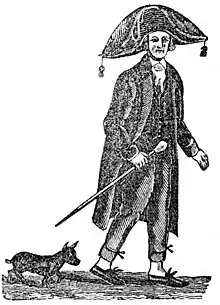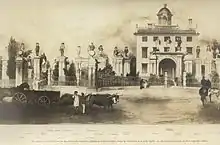Timothy Dexter
Timothy Dexter (January 22, 1747 – October 23, 1806) (self-styled Lord Timothy Dexter) was an American businessman noted for his eccentric behavior and writings. He became wealthy through marriage and a series of improbably successful investments, and spent his fortune lavishly. Though barely educated or literate, Dexter considered himself "the greatest philosopher in the Western World", and authored a book, A Pickle for the Knowing Ones, which espouses his views on various topics and became notorious for its unusual misspellings and grammatical errors.
Timothy Dexter | |
|---|---|
 Dexter in 1805 | |
| Born | January 22, 1747 |
| Died | October 23, 1806 (aged 59) |
| Resting place | Old Hill Burying Ground, Dexter Family Plot, Newburyport |
| Occupation | Entrepreneur |
| Known for | Uncommon good fortune, eccentricity |
| Notable work | A Pickle for the Knowing Ones (1802) |
| Spouse |
Elizabeth (Lord) Frothingham
(m. 1770) |
| Children |
|
Biography
Dexter was born in Malden[1] in the Province of Massachusetts Bay. He had little schooling and dropped out of school to work as a farm laborer at the age of eight.[2] When he was 16, he became a tanner's apprentice.[3] In 1769, he moved to Newburyport, Massachusetts.[4] He married 32-year-old Elizabeth Frothingham, a rich widow, and he then bought a mansion with the money.[4]
At the end of the American Revolutionary War, he purchased large amounts of depreciated Continental currency that was worthless at the time.[4] At the war's end, the U.S. government made good on its notes at one percent of face value, while Massachusetts paid its own notes at par.[4] His investment enabled him to amass a considerable profit. He built two ships and began an export business to the West Indies and Europe.
Being a member of the upper class, Dexter decided to pursue a career in local politics. However, many of those in power were not very keen on allowing someone as uneducated as Dexter to have a position in politics. Eventually however, the Malden local government would bestow upon Dexter the position of the official informer of deer, despite the fact that, at the time, there were not any deer in Malden.
Because he was largely uneducated, his business sense was considered peculiar. He was advised to send bed warmers—used to heat beds in the cold New England winters—for resale in the West Indies, a tropical area. This advice was a deliberate ploy by rivals to bankrupt him. His ship's captain sold them as ladles to the local molasses industry and made a handsome profit.[5] Next, Dexter sent wool mittens to the same place, where Asian merchants bought them for export to Siberia.[2]
People jokingly told him to "ship coal to Newcastle". Fortuitously, he did so during a Newcastle miners' strike, and his cargo was sold at a premium.[6][7] On another occasion, practical jokers told him he could make money by shipping gloves to the South Sea Islands. His ships arrived there in time to sell the gloves to Portuguese boats on their way to China.[6]
He exported Bibles to the East Indies and stray cats to Caribbean islands and again made a profit; Eastern missionaries were in need of the Bibles and the Caribbean welcomed a solution to rat infestation.[2] He also hoarded whalebones by mistake, but ended up selling them profitably as corset stays.[2]
While subject to ridicule, Dexter's boasting makes it clear that he understood the value of cornering the market on goods that others did not see as valuable and the utility of "acting the fool".[8]
New England high society snubbed him. Dexter bought a large house in Newburyport from Nathaniel Tracy, a local socialite, and tried to emulate him.[2][4] He decorated this house with minarets, a golden eagle on the top of the cupola, a mausoleum for himself, and a garden of 40 wooden statues of famous men, including George Washington, William Pitt, Napoleon Bonaparte, Thomas Jefferson, and himself. The last had the inscription, "I am the first in the East, the first in the West, and the greatest philosopher in the Western World".[1] Dexter also bought an estate in Chester, New Hampshire.
Despite his good fortune, his relationship with his family suffered. He frequently told visitors that his wife (who was actually alive) had died, and that the woman frequenting the building was simply her ghost.[2] In one notable episode, Dexter faked his own death to see how people would react, and about 3,000 people attended Dexter's mock wake. When Dexter did not see his wife cry, he revealed the hoax and promptly caned her for not sufficiently mourning his death.[4][9]
Writing
At age 50, Dexter authored the book A Pickle for the Knowing Ones,[lower-alpha 1] in which he complained about politicians, the clergy, and his wife. The book contains 8,847 words and 33,864 letters, but without any punctuation and with unorthodox spelling and capitalization. One section begins:[8]
Ime the first Lord in the younited States of A mercary Now of Newburyport it is the voise of the peopel and I cant Help it and so Let it goue
The first edition was self-published in Salem, Massachusetts, in 1802. Dexter initially distributed his book for free, but it became popular and was reprinted eight times.[3] The second edition was printed in Newburyport in 1805.[10] In the second edition, Dexter responded to complaints about the book's lack of punctuation by adding an extra page of 11 lines of punctuation marks with the instruction that printers and readers could insert them wherever needed—or, in his words, "thay may peper and solt it as they plese".[11]
Legacy

Dexter attempted to burnish his own legacy by enlisting the efforts of Jonathan Plummer, a fish merchant and amateur poet, who extolled his patron in verse:[8]
Lord Dexter is a man of fame;
Most celebrated is his name;
More precious far than gold that's pure,
Lord Dexter shine forevermore.
Some of his social contemporaries considered him very unintelligent; his obituary considered "his intellectual endowments not being of the most exalted stamp".[4][12]
The Probate Office valued his estate at $35,027.39 (roughly equivalent to $711,182 in 2021).[13]
Dexter's Newburyport house became a hotel.[2] Storms ruined most of his statues; the only identified surviving statue was that of William Pitt.

In 1984 Prof. William Quill, who was raised on Johnston Street in Newburyport, purchased Timothy Dexter's House for $200,000 and restored it.[14]
References
- Chisholm, Hugh, ed. (1911). . Encyclopædia Britannica. Vol. 8 (11th ed.). Cambridge University Press. p. 141.
- Margaret Nicholas, The World's Greatest Cranks and Crackpots, ISBN 978-0-7064-1713-5, pp. 147–151.
- The Reader's Digest Book of Strange Stories, Amazing Facts. Reader's Digest Association. 1975. p. 501. ISBN 9780276000805.
- History of Newburyport, Mass., 1764–1905. Vol. II. Chapter XXVII. Eccentric characters, pp. 419–431 and following. Accessed December 2019 via ancestry.com paid subscription site.
- Jim Stillman (November 15, 2006). "Lord Timothy Dexter of Newburyport, Massachusetts: Wealthy by Mistake?". Yahoo! Contributor Network. Archived from the original on July 19, 2012.
- Knapp, Samuel L. (1858). Life of Lord Timothy Dexter: Embracing sketches of the eccentric characters that composed his associates, including "Dexter's Pickle for the knowing ones". Boston: J. E. Tilton and Company. Archived from the original on December 2, 2007.
- Nash, Jay Robert (1982). Zanies: The World's Greatest Eccentrics. New Century Publishers. ISBN 978-0-8329-0123-2.
- Stephen Gencarella (May 1, 2018). Wicked Weird & Wily Yankees: A Celebration of New England's Eccentrics and Misfits. Globe Pequot. pp. 1–14. ISBN 978-1-4930-3267-9.
- Todd, William Cleaves. Timothy Dexter. Boston, Massachusetts: David Clapp & Son, 1886: 6.
- Currier, John J. (1906). History of Newburyport, Mass., 1764–1905. Newburyport: Dalcassian Publishing Company. p. 495.
- Nelson, Randy F. The Almanac of American Letters. Los Altos, California: William Kaufmann, Inc., 1981: p. 207. ISBN 978-0-86576-008-0
- Timothy Dexter obituary notice, Newburyport Herald, October 24, 1806.
- Todd, William Cleaves. Timothy Dexter. Boston, Massachusetts: David Clapp & Son, 1886: p. 11.
- Shea, Jack (January 29, 2018). "Man who faced challenge restoring Lord Timothy Dexter's mansion. Professor rebuilt legendary home".
- Also known as Plain Truth in a Homespun Dress.
Sources
- Samuel L. Knapp (1858). The Life of Lord Timothy Dexter, with Sketches of the Eccentric Characters that Composed his Associates, including his own writings, "Dexter's Pickle for the knowing ones", &c., &c. Boston: J. E. Tilton and Co.
- Dexter, Timothy; Quince, Peter (1881). A pickle for the knowing ones: or, Plain truths in a homespun dress. S. A. Tucker. 36 pages. Archived from the original on July 29, 2020. Retrieved May 19, 2011.
- Wilson, J. G.; Fiske, J., eds. (1900). . Appletons' Cyclopædia of American Biography. New York: D. Appleton.
External links
- Works by Timothy Dexter at Project Gutenberg
- Works by or about Timothy Dexter at Internet Archive
- The Official Virtual Seat on the "Noue Systom of Knollege & Lite" Assigned the Notable and Most Noble Lord Timothy Dexter
- A Pickle For The Knowing Ones, at Project Gutenberg
- Complete transcription of "A Pickle for The Knowing Ones; or Plain Truths in a Homespun Dress" ~ with translation and annotations
- NPR’s "Weekend Edition": The 'Literary' Legacy of Lord Timothy Dexter
- Timothy Dexter at Find a Grave